Diplomatic Bluebook 2018
Chapter 2
Japan's Foreign Policy that Takes a Panoramic Perspective of the World Map
5 Oceania
(1)Australia
A Brief Summary and Overview
In Australia, Prime Minister Turnbull's administration entered its third year since its inauguration. In November 2017, the Australian Government issued a diplomatic white paper for the first time in 14 years. It was announced that as the guidelines of future foreign policy, Australia will promote an open, inclusive and prosperous Indo-Pacific region, oppose protectionism, promote and protect international rules, etc., while also strengthening cooperation with partners including Japan.
With the region facing a wide range of issues, the “Special Strategic Partnership” between Japan and Australia, which share fundamental values and strategic interests, is more important than ever. The two countries' strategic visions towards maintenance and strengthening a free and open international order based on the rule of law in the Indo-Pacific region are aligned in wide ranging areas. With the Prime Ministers' mutual visits and close coordination between the Foreign Ministers serving as the basis, the two countries have been further deepening political and security cooperation and collaboration towards stability and prosperity of the international community.
On the economic front, the two countries are promoting free trade, including the TPP agreement. Australia is the sixth largest trading partner for Japan and Japan is the second largest trading partner for Australia, and the two countries are further developing mutually complementary economic relations based on the Japan-Australia EPA. Furthermore, multilateral coordination and partnerships such as the Japan-U.S.-Australia, Japan-Australia-India and Japan-U.S.-Australia-India relations are being steadily strengthened.
In January 2017, Prime Minister Abe visited Sydney as part of mutual visits made by the Prime Ministers of the two countries, and confirmed the deepening of the “Special Strategic Partnership” in a wide range of areas including the deepening of security and defense cooperation, economic issues and people-to-people exchanges, while also strengthening the personal relationship between the two leaders. In January 2018, Prime Minister Turnbull visited Japan to hold a Summit Meeting with Prime Minister Abe, and attended a Special Meeting (Four Ministers' Meeting) of the National Security Council. The Prime Ministers agreed to further strengthen the “Special Strategic Partnership,” and confirmed the need to strengthen coordination and cooperation in order to realize their vision on the Indo-Pacific region. Furthermore, the two Prime Ministers confirmed close cooperation in dealing with regional affairs, including the North Korea situation, and agreed to strengthen cooperation in a wide range of areas such as security and defense, economy including TPP agreement and people-to-people exchanges. Moreover, the Foreign Ministers held meetings at the Foreign and Defence Ministerial Consultation (“2+2”), as well as on the occasion of the UN General Assembly in September, and the APEC Ministerial Meeting in November (Da Nang, Viet Nam). The two countries shared their views on the increasingly severe regional situations and confirmed that they would continue to cooperate closely toward the peace and stability of the region.
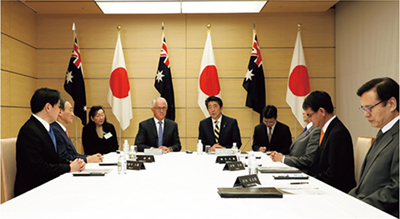 Special Meeting of the National Security Council (Meeting among Four Ministers) (January 18, Tokyo; Photo: Cabinet Public Relations Office)
Special Meeting of the National Security Council (Meeting among Four Ministers) (January 18, Tokyo; Photo: Cabinet Public Relations Office)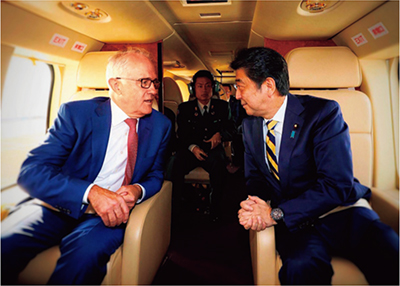 Both leaders visit JGSDF Camp Narashino (January 18; Photo: Cabinet Public Relations Office (Prime Minister's official Twitter account))
Both leaders visit JGSDF Camp Narashino (January 18; Photo: Cabinet Public Relations Office (Prime Minister's official Twitter account))B Cooperation in the Security Field
To ensure peace and prosperity of the Indo-Pacific region, Japan and Australia have continued to steadily strengthen and expand cooperation in the field of security. 2017 marked a milestone of the 10th anniversary since the 2007 Japan-Australia Joint Declaration on Security Cooperation. In January, the leaders of both countries attended the signing of the new Japan-Australia Acquisition and Cross-Servicing Agreement (ACSA) (the agreement entered into force in September). At the same time, the two countries expressed their expectations for the early conclusion of an agreement to mutually improve the administrative, policy and legal procedures for facilitating joint operations and exercises between Japan's Self-Defense Forces and Australia's Defense Forces.
At the 7th Foreign and Defence Ministerial Consultation (“2+2”) held in April, the two countries agreed to further strengthen security and defense cooperation between Japan and Australia, in order to maintain and strengthen a free and open regional and international order, based on the rule of law. At the same time, the two countries confirmed strengthening coordination regarding North Korea, maritime security including the South China Sea and the East China Sea and the Pacific region.
Furthermore, Japan and Australia, both of which are allies of the U.S., are continuing to work on further enhancing Japan-U.S.-Australia cooperation. The Japan-U.S.-Australia Trilateral Strategic Dialogue (TSD) was held for the first time since the inauguration of the Trump administration in the U.S., and views were exchanged on various regional issues such as North Korea, the South China Sea, the East China Sea and measures countering violent extremism. It was also agreed that the three countries of Japan, the U.S. and Australia would coordinate and cooperate closely including these issues. Moreover, in November, a Japan-U.S.-Australia Summit Meeting was held with discussions centered on North Korea, and confirmed the unwavering solidarity between Japan, the U.S. and Australia to ensure peace and prosperity in the region.
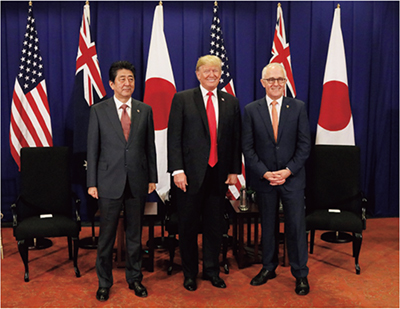 Japan-U.S.-Australia Summit Meeting (November 13, Manila, the Philippines; Photo: Cabinet Public Relations Office)
Japan-U.S.-Australia Summit Meeting (November 13, Manila, the Philippines; Photo: Cabinet Public Relations Office)C Economic relations
Japan and Australia have taken the lead in promoting a system of free trade in the region through close cooperation, including the TPP agreement and the Regional Comprehensive Economic Partnership (RCEP). During the Summit Meeting in November (Manila, the Philippines) and the Foreign Ministers' Working Dinner (Da Nang, Viet Nam), the two countries agreed to cooperate for an early conclusion of TPP11. Between Japan and Australia, mainly industrial products such as automobiles are being exported to Australia, while mainly energy resources such as coal and natural gas, and agricultural products such as beef are being imported into Japan, in a mutually complementary economic relationship that has been developed steadily over the years. 2017 marked the 60th anniversary of the signing of the Australia-Japan Agreement on Commerce, and major commemorative events were held in various places. Japan is the second biggest investor for Australia, and since the entry into force of the Japan-Australia EPA in January 2015, there have been active exchanges of goods, funds and people between the two countries. Moreover, efforts are being made to further develop economic relations between Japan and Australia under the Conference for Promotion of Exchanges between Japan and Australia, with an innovation-led reform of industrial structures and region-led promotion of relationships serving as the two pillars.
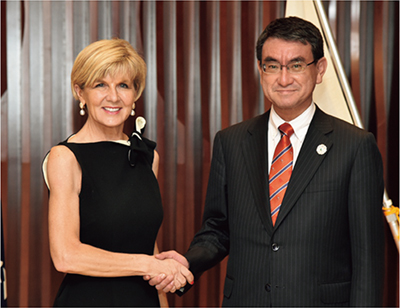 Japan-Australia Working Dinner (November 7, Da Nang, Viet Nam)
Japan-Australia Working Dinner (November 7, Da Nang, Viet Nam)D Cultural and People-to-People Exchanges
There exists a foundation for affinity toward Japan in Australia cultivated over many years, as shown by the fact that approximately 360,000 people in Australia learn the Japanese language (the highest number of learners per population in the world), and that there are over 100 sister city relations. In order to strengthen the foundation of Japan-Australia relations, various initiatives have been implemented, including the promotion of mutual understanding through JENESYS 2017, the exchange program including young people, and the “New Colombo Plan,” as well as the promotion of reconciliation through the invitation program of former Australian prisoners of war (POWs), and the Young Political Leaders Exchange. Particularly, in light of the decrease in the number of the Australian former POWs who can travel to Japan, a commemorative event was held in December to reflect on the achievements of this program.
E Cooperation in the International Community
In order to make an active contribution to peace and stability in the international community, the two countries have been strengthening cooperation in wide ranging areas. In particular, cooperation has been deepened in addressing various issues facing the Indo-Pacific region such as maritime security, the nuclear and missile development, and the abductions issue by North Korea. Other than that, there has also been close coordination on Pacific Island countries where Australia plays an important role. In December, the Second Japan-Australia Pacific Policy Dialogue (Tokyo) was held, and exchanged views on regional affairs, which confirmed coordination toward the Eighth Pacific Islands Leaders Meeting (PALM8) in May 2018. Furthermore, the two countries are working together as important partners on global issues, such as UN peacekeeping operations, disarmament and non-proliferation, climate change, and UN Security Council reforms.
(2) New Zealand
A Brief Summary and Overview
A parliamentary election was held in New Zealand in September, and the National Party failed to attain the majority of seats on its own, resulting in negotiations for the forming of coalitions between different parties. This led to the forming of a coalition between the New Zealand Labour Party and New Zealand First Party, which was inaugurated in October. It was the first time in nine years, since 2008, for a change in Government. Japan and New Zealand share fundamental values, such as democracy and a market economy. The two countries have been maintaining good relations over the years. In recent years, under the “Strategic Cooperative Partnership,” the two countries have been strengthening bilateral cooperation in areas including the economy, security and defense cooperation, and people-to-people exchanges and also cooperative relations on issues facing the region and the international community.
B Mutual VIP Visits
From Japan, State Minister for Foreign Affairs Kishi visited New Zealand in February to hold a meeting with Foreign Minister McCully. He also attended the commemorative ceremony to mark the 6th anniversary of the Christchurch earthquake, and held meetings with the top government officials.
From New Zealand, Prime Minister English visited Japan in May to hold a bilateral meeting with Prime Minister Abe. The two countries agreed to promote peace and stability based on the rule of law, and free trade and investment based on rules, as well as actively build on the partnership between the two countries.
Moreover, during the APEC Economic Leaders' Meeting (Da Nang, Viet Nam), Prime Minister Abe held the first Summit Meeting since the change of Government with Prime Minister Ardern. At the APEC Ministerial Meeting held just prior to the Summit Meeting, Foreign Minister Kono also held a Foreign Ministers' Meeting with Deputy Prime Minister and Foreign Minister Peters, where it was confirmed that Japan-New Zealand relations would be strengthened.
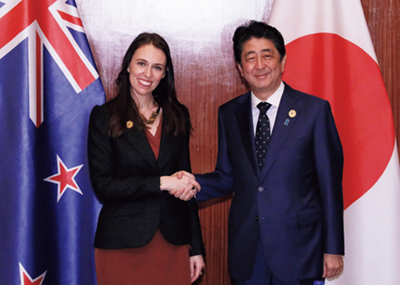 Prime Minister Abe exchanges a handshake with Prime Minister Ardern (November 10, Da Nang, Viet Nam; Photo: Cabinet Public Relations Office)
Prime Minister Abe exchanges a handshake with Prime Minister Ardern (November 10, Da Nang, Viet Nam; Photo: Cabinet Public Relations Office)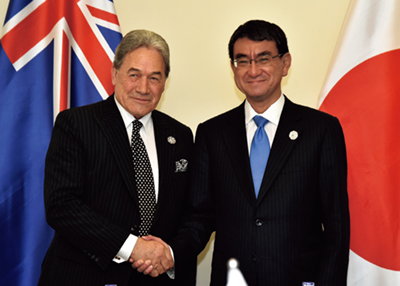 Japan-New Zealand Foreign Ministers' Meeting (November 8, Da Nang, Viet Nam)
Japan-New Zealand Foreign Ministers' Meeting (November 8, Da Nang, Viet Nam)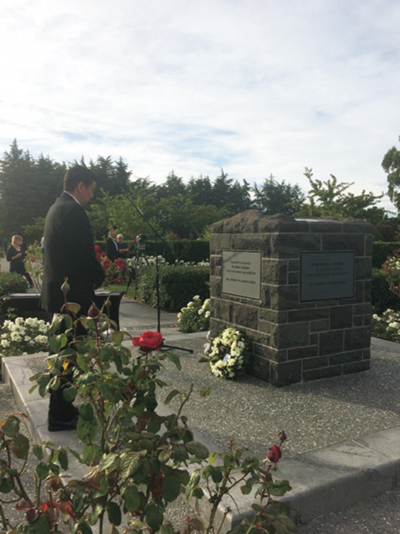 State Minister for Foreign Affairs Kishi, offers flowers at Avonhead Park Cemetary (February 22, Christchurch, New Zealand)
State Minister for Foreign Affairs Kishi, offers flowers at Avonhead Park Cemetary (February 22, Christchurch, New Zealand)C Economic Relations
The two countries enjoy a complementary economic relationship, and the Prime Ministers of Japan and New Zealand confirmed the importance of the TPP Agreement during the Summit Meeting in November. The two countries agreed to cooperate in its early entry into force. Furthermore, in the fields of food and agriculture, the two-year extension of the “New Zealand Hokkaido Dairy Collaboration Project” was decided in June 2016 after the completion of a two-year pilot project which began in 2014, and is under implementation. This project is designed to identify methods of improving the profitability of dairy farming in Japan.
D Cultural and People-to-People Exchanges
In FY2017, 20 university students from New Zealand visited Japan as part of JENESYS 2017. More than 1,100 young people from New Zealand have now visited Japan through youth related programs.
In addition, networking between sister cities is making progress with an aim to promote mutual understanding among the youth. Furthermore, the New Zealand Government sponsored “Game On English” which extends support to English language education for Japanese students through rugby, in which New Zealand won the World Cup twice in a row. Under this program, 24 Japanese students visited New Zealand in 2017.
E Cooperation in the International Community
The two countries are cooperating closely for the peace and stability of the international community, including the United Nations. Furthermore, Japan and New Zealand have been playing active roles in the stability and prosperity of the region, including collaboration in regional cooperation frameworks such as the East Asia Summit (EAS), the ASEAN Regional Forum (ARF) and the Asia Pacific Economic Cooperation (APEC). As for Pacific island countries, the two countries have also been cooperating through the Pacific Islands Leaders Meeting (PALM).
(3) Pacific Island Countries (PICs)
A Brief Summary and Overview
The PICs and Japan are bound by the Pacific Ocean, have deep historical ties, and are important partners for Japan in areas such as cooperation in the international arena and the supply of fisheries and mineral resources. They are becoming increasingly important from a geographical perspective as they are located at the heart of the Pacific Ocean. Japan has been holding the Pacific Islands Leaders Meeting (PALM) once every three years since 1997, and the Eighth Pacific Islands Leaders Meeting (PALM8) will be held in May 2018. Japan has also been holding PALM Ministerial Interim Meetings roughly every three years since 2010, and since 2014, Japan has been holding Japan-Pacific Islands Leaders Meetings every year on the occasion of the UN General Assembly held in September, in New York. Furthermore, Japan has been constantly attending the Pacific Islands Forum (PIF) Post Forum Dialogue at a high level since its inception in 1989. Japan has been further strengthening relations with PICs through visits at various levels using the occasion of these international conferences, ODA projects, and active people-to-people exchanges.
B Pacific Islands Leaders Meeting (PALM)
The Pacific Islands Leaders Meeting (PALM) marked its 20th anniversary in 2017. On May 18 and 19, 2018, the Eighth Pacific Islands Leaders Meeting (PALM8) will be held in Iwaki City, Fukushima Prefecture. Leaders from 14 PICs, including Samoa which will serve as co-chair, and cabinet level participants from Australia and New Zealand are expected to attend the Summit.
Prior to this in January 2017, the PALM Third Ministerial Interim Meeting of the Pacific Islands Leaders Meeting was held in Tokyo. Foreign Minister Kishida and Secretary of Foreign Affairs of the Federated States of Micronesia Robert served as co-chairs, and exchanges of views were held on the follow-up of the PALM7 and the direction towards the PALM8, and the participants agreed to cooperate closely to ensure the success of the PALM8. Furthermore, Prime Minister Abe, who visited New York in September on the occasion of the UN General Assembly, held the fourth Japan-Pacific Islands Summit Meeting and confirmed their coordination on the North Korean affairs, and in preparation for the PALM8, exchanged views on self-sufficient and sustainable growth including the areas such as climate change, the environment, disaster prevention, trade, investment and tourism, invigoration of people-to-people exchanges, and various maritime issues. Various countries expressed their gratitude for Japan's contributions through PALM and other initiatives, and confirmed that they would accelerate preparations to ensure the success of the PALM8.
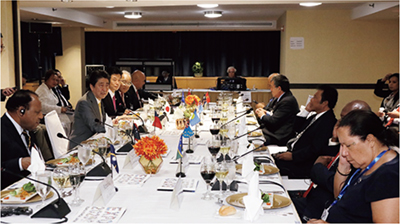 The 4th Japan-Pacific Islands Summit Meeting (September 19, New York, the U.S.; Photo: Cabinet Public Relations Office)
The 4th Japan-Pacific Islands Summit Meeting (September 19, New York, the U.S.; Photo: Cabinet Public Relations Office)C Mutual VIP Visits
In January, Parliamentary Vice-Minister for Foreign Affairs Odawara visited Palau to attend the inauguration ceremony of the President, and held meetings with President Remengesau and others. President Remengesau visited Japan in September and held a meeting with Foreign Minister Kono. In October, President Christian of Micronesia visited Japan and held meetings with Prime Minister Abe and Foreign Minister Kono, and exchanged views on the strengthening of bilateral ties, cooperation toward the PALM8, regional issues including North Korea, and cooperation in the international arena including the UN Security Council reform. In November, Parliamentary Vice-Minister for Foreign Affairs Iwao Horii visited the Marshall Islands as the head of the Public-Private Joint Economic Mission and attended a trade and investment seminar and held a meeting with President Heine. In the same month, Vice President and Minister of Justice of Palau Oilouch was invited to Japan to hold the Meeting with Foreign Minister Kono, while Minister of Communication and Information Technology of Samoa Afamasaga and the former President of Micronesia Urusemal held meetings with Parliamentary Vice-Minister for Foreign Affairs Iwao Horii respectively.
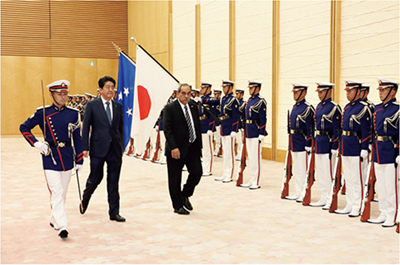 Visit by President Christian of Micronesia (October 25, Tokyo; Photo: Cabinet Public Relations Office)
Visit by President Christian of Micronesia (October 25, Tokyo; Photo: Cabinet Public Relations Office)D Relationship with Pacific Islands Forum (PIF)
In September, the Pacific Islands Forum Leaders Meeting was held in Samoa, and Parliamentary Vice-Minister for Foreign Affairs Iwao Horii attended the summit as a Special Envoy of the Prime Minister. Japan expressed its intention to cooperate with PICs in ensuring free and open maritime order based on the rule of law, the sustainable use of ocean resources, and the management and conservation of the marine environment as priority issues in the region. Furthermore, Parliamentary Vice-Minister for Foreign Affairs Iwao Horii held meetings with Prime Minister Tuilaepa of Samoa and various other leaders from PICs.
E Cultural and People-to-People Exchanges
As part of efforts to bolster the “assistance for human resource development to 4,000 people in three years” as pledged at the PALM7 in 2015, people-to-people exchanges were implemented between students, through JENESYS. Furthermore, from FY2016 Japan commenced the Pacific-Leaders' Educational Assistance for Development of State (Pacific-LEADS) for young government administrators of PICs, and in FY2017 the program accepted 41 trainees.
F Establishment of a Liaison Office in Vanuatu
Vanuatu is an island nation located in the Melanesia region of the South Pacific, and it is an important country that has been supporting Japan's position in the UN Security Council reform and in international organization elections. In light of this fact, Japan established a liaison office in Vanuatu in January 2018.
